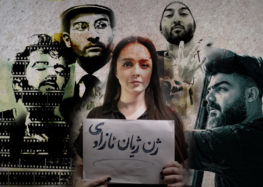“None of Our Rights Have Been Observed,” Says Abdolfattah Soltani’s Wife
 Massoumeh Dehghan, wife of prominent human rights defender Abdolfattah Soltani, told the International Campaign for Human Rights in Iran that neither her husband’s nor the family’s rights have been respected since his imprisonment almost eight months ago. Dehghan told the Campaign that authorities have denied Soltani his rightful release on bail, have not returned any of the items confiscated during his arrest, and refused to grant his family permission to see him during the Persian New Year.
Massoumeh Dehghan, wife of prominent human rights defender Abdolfattah Soltani, told the International Campaign for Human Rights in Iran that neither her husband’s nor the family’s rights have been respected since his imprisonment almost eight months ago. Dehghan told the Campaign that authorities have denied Soltani his rightful release on bail, have not returned any of the items confiscated during his arrest, and refused to grant his family permission to see him during the Persian New Year.
“According to the law, Mr. Soltani should be released on bail until the Appeals Court convenes and issues his final ruling. At this time, his lawyers have submitted their appeal request to the court and we are waiting for an appointment,” said Dehghan. She that she had not received any responses from judicial authorities, even after going to the Tehran Prosecutor’s Office several times and writing letters.
On 10 September 2011, authorities arrested prominent human rights lawyer and co-founder, along with Nobel Peace Prize laureate Shirin Ebadi, of the Defenders of Human Rights Center, Abdolfattah Soltani. Branch 26 of Tehran Revolutionary Court under Judge Pirabbasi tried Soltani on charges of “being awarded the [2009] Nuremberg International Human Rights Award,” “interviewing with media about his clients’ cases,” and “co-founding the Center for Human Rights Defenders.”
On 4 March 2012, authorities sentenced Soltani to 18 years of prison in exile in Borazjan and a 20-year ban on legal practice. He is currently in Evin Prison’s General Ward, where he was transferred after his sentence was issued.
Dehghan also told the Campaign her husband was not granted furlough for the Persian New Year holiday. “During Mr. Soltani’s detention, we were not allowed to visit him in person even once. Last week they gave many prisoner families permission to have in-person visits on the occasion of the [Iranian] New Year. I asked the officer in charge to grant us in-person visitation, too, but he told me that he was unable to give in-person visits to Mr. Soltani … If there are laws about visitation and furlough rights, all prisoners must be able to have them.” Typically, many prisoners in Iran are granted a short furlough to spend time with their families during the Persian New Year. In recent years, however, authorities have forbidden many political prisoners from this privilege.
“Not everything has been returned, for example, family photo albums, my personal items such as my notebooks, hand-written notes, and even my bank passbook. I don’t know what use these items have for them. When forces searched our home in 2007, also, they took things with them such as photo albums, radio sets, and personal CDs, which they have not returned yet. These are personal and family items which I do not wish to be in their hands. But every time I have gone to claim them, they have told me to come back later. How many times should I go after them?” Dehghan told the Campaign.
“Families should not be punished. They don’t grant in-person visits nor furloughs. They issue strange sentences such as exile. Assuming that Mr. Soltani goes to Borazjan, who suffers the most here? Certainly the family who will have to travel a long distance to see him. Majid Dori’s mother said a few days ago that each time they go to visit Majid, they lose three days in transit in order to see him for one hour in a prison in another city. Are such sentences in harmony with the spirit of Islamic laws, humanity, and the Islamic Republic?” she said.






